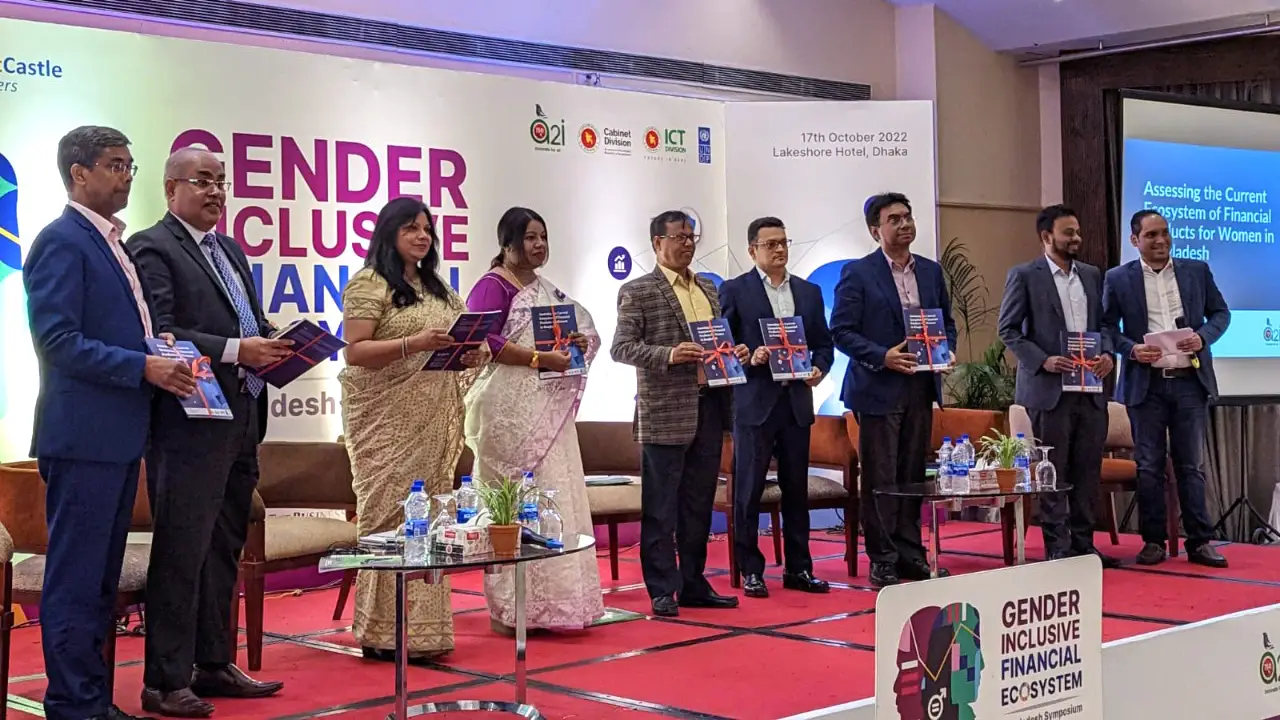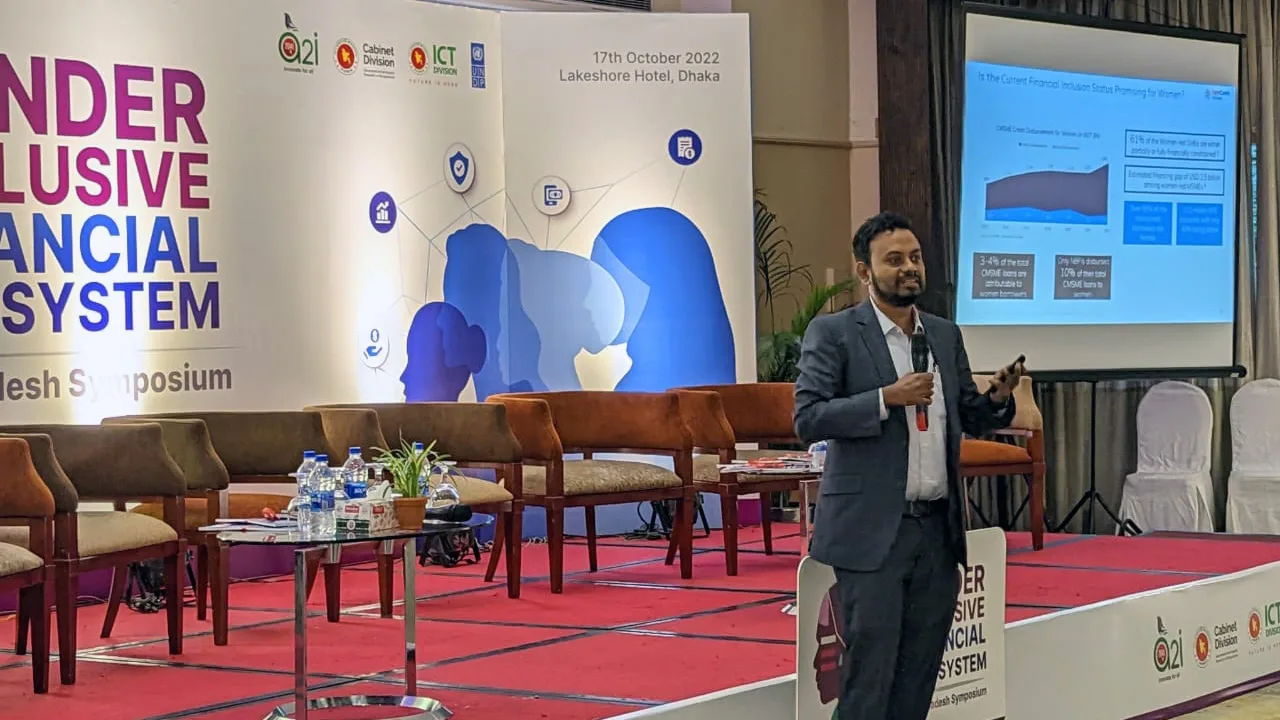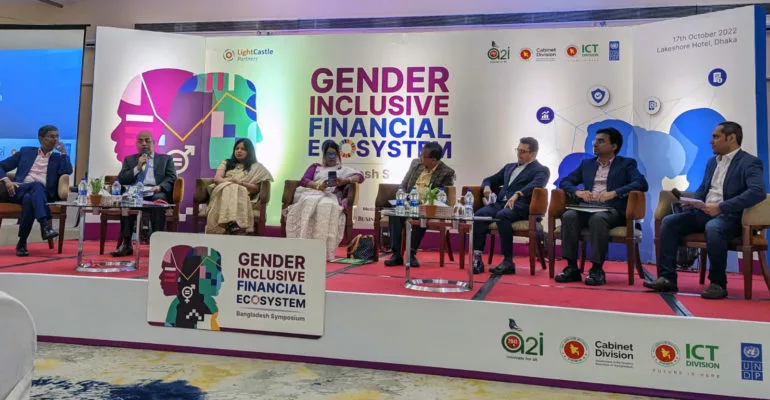GET IN TOUCH
- Please wait...

LightCastle Partners was commissioned to conduct a study by the Aspire to Innovate (a2i) program of the ICT Division, supported by the United Nations Development Programme (UNDP) and funded by the Bill & Melinda Gates Foundation, titled: “Assessing the Current Ecosystem of Financial Products for Women in Bangladesh”. The report of the study was formally launched on the 17th of October 2022, at a symposium titled “Gender Inclusive Financial Ecosystem—Bangladesh Symposium”. The event was organized by a2i in partnership with LightCastle Partners.

The proceedings commenced with a keynote presentation on the report findings by Zahedul Amin, Co-founder and Director, LightCastle Partners, followed by a panel discussion moderated by Bijon Islam, Founding Partner & CEO of LightCastle Partners, including the following group of esteemed panelists:
The presentation primarily focused on the current status quo of female financial inclusion, existing challenges and gaps hindering access to financial services for women, and strategic recommendations for fostering greater financial inclusion for women.

The panelists discussed means to strengthen the ecosystem. Md. Abul Bashar, ED of the Bangladesh Bank, said that “Every woman who is bankable should come under the umbrella of financial inclusion and the Bangladesh Bank is working tirelessly for it. We have policies in the right places, but in many cases, women themselves don’t know of them and hence, cannot take advantage of them. To address this issue, awareness campaigns are a must”. He also mentioned that the funds for incentivizing lending to women e.g. refinancing schemes are not being properly utilized by the financial institutions. To this end, he requested the banking community to proactively support the gender-inclusive approach to lending.
Ms. Snigdha Ali, Senior Program Officer & Gender Advisor of the Bill and Melinda Gates Foundation, focused on the importance of financially including women in the agricultural sector and referred to mobile banking as a possible way forward. Referring to previous endeavors on this front she said, “We have seen wonderful results from the wage digitization projects. Taking the learning from there, we are thinking of expanding to the agriculture sector. According to iFarmer’s data, 17% of smallholders get finance from MFIs. This data is gender-neutral. Hence, the status of female farmers is presumed to be worse. Development Organizations, the Private Sector, and Regulators all need to come together to work on the Financial Inclusion of Women”.
Md. Arfan Ali, Ex-President & Managing Director, Bank Asia reiterated the importance of agent banking and mobile financial services to financially include women from rural areas. With regard to the culture of the banking community, he said, “Bankers’ attitude to financing needs to be addressed. We are very comfortable operating in urban areas with 73% of our portfolio coming from there. Fintechs will need to innovate and supersede the barriers faced by the FIs. For that, the partnership model is a promising opportunity. From the supply side, bankers should be thinking more from macro perspectives.” Emphasizing the importance of record keeping for getting access to finance, he said, “Keep a good record of your transaction and you will get credit. Hence, record-keeping is essential. There are emotional and authoritative aspects to looking from the regulatory side.” The veteran banker also mentioned the challenges faced due to the lending rate cap. Demand Supply gaps are the reason why women are taking loans at higher rates from loan sharks. If the interest rate is not giving you(banks) the incentive, FIs will not give out loans. Bank’s earnings must be secured in order for them to give out loans. Financial inclusion activities for women should be spearheaded jointly through tri-party collaboration between the FIs, the regulators, and the Development sector.
Mr. Shyamol B Das, Deputy Managing Director and Chief Information Officer, Meghna Bank Limited talked about the importance of collaborating with the Fintech industry for increasing the financial inclusion of women. “We need to look at what is happening in the ecosystem. Banks cannot give out riskier loans to smallholders while operating under a capped interest rate. Hence, corporate banking is always more lucrative as the expense-to-income ratio is better. Fintechs can reach these levels at a much lower cost than other FIs. Presently, each of the players is working for their interest and from their point of view. No one is communicating the importance and usability of loans to women. We need to be innovative and bond with Fintechs & MFS. Current regulations should be changed to facilitate this collaboration.”
Ms. Farida Pervin, Director General of the DWA highlighted the government’s current efforts to digitally educate women to bring them into the financial ecosystem. “Tothhoapa is an initiative where a female representative goes door to door to teach women about digital communication, mobile operations, basic self-testing for health, etc. The program has reached over 1 crore women. Disbursement of funds to Vulnerable women groups is being done through digital means. To educate them digitally, training sessions are being conducted through local digital centers for women.” In terms of paving the way forward, she said, “Government needs to ensure better internet in the rural areas. Mobile phones should be made affordable for women and registered specifically for them. A capable women demographic is essential for Bangladesh to tackle the challenges of the 4th IR in 2041.”
Dr. Selim Raihan, Professor, Department of Economics of Dhaka University, emphasized the role of data in creating an encouraging ecosystem to increase women’s financial inclusion
“We have to understand the feedback loop of financing women and to do that, we need to look at proper data which is not available at the moment. A nationwide picture of women’s financial landscape should be painted following a nationwide survey done by the Bangladesh Bureau of Statistics. Many women in Bangladesh are engaged in productive activities within their homes, but the labor force participation data does not cover unpaid labor. These facts need to be understood and accounted for. For diversification of our income-earning demography, we need proper data from the supply and demand side covering the internal dynamics of lending and spending rather than top-level data only. Proceeding to talk about the lending rate cap, he said, “The 9% cap is not acceptable at all since it effectively contributes to credit rationing. If we want to lend to women, the cap would not help.”
The session ended with closing remarks from Dr. Dewan Muhammad Humayun Kabir, Project Director (Joint Secretary), a2i, who summarized the discussion points and requested the relevant system’s actors to work in tandem for the financial inclusion of Women. “Women are going ahead on their own, engaging in f-commerce businesses. However, from a regulatory aspect, we are still not able to bring them under formal financing. FIs, MFIs, and Regulators often play the blame game with each other. Success lies in collaboration, not just criticism.”
Our experts can help you solve your unique challenges
Stay up-to-date with our Thought Leadership and Insights